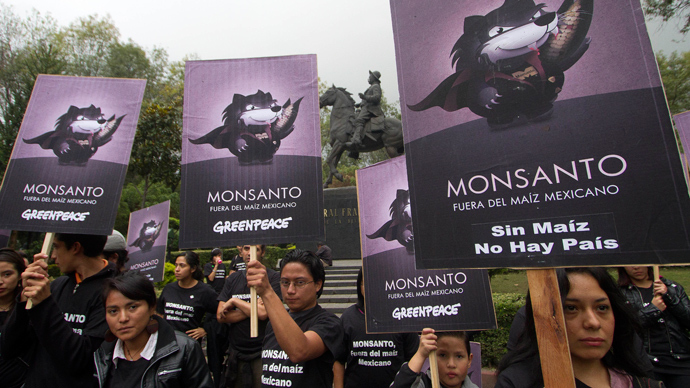‘Monsanto voted world’s most evil corp year after year for good reasons’

Biotech giant Monsanto has worked for at least the last 20 years to use genetically modified organisms to replace nature and eliminate billions of years of evolution, all for their greater profit and control, author Jeffrey Smith, told RT.
Smith, who has written extensively about genetically modified
organisms, said impending mass demonstrations around the globe
aimed at protesting Monsanto and genetically modified crops is
the world’s way of rejecting the company’s grim vision of the
future.
RT: Monsanto claims there is no existing proof that
GMOs cause health problems. You wrote a book entitled, “The
Documented Health Risks of Genetically Modified Foods.” What do
you say about these risks?
JS: There are thousands of doctors prescribing non-GMO
diets, and people are getting better from gastrointestinal
disorders, immune problems, organ damage, etc. When the American
Academy of Environmental Medicine looked at the animal feeding
studies on GMOs, they said that the lab rats had suffered from
these same problems. And these same problems are on the rise in
the US population since GMOs were introduced.
Now we know that the GMOs on the market have either higher levels
of weed killer - Roundup, which is toxic - or a bug killer, Bt
toxin. If you look at the characteristics of these toxins in
Monsanto’s crops, it would predispose us to these same disorders.
RT: Are the toxins, the pesticides you’re referring to,
are they applied to the crops or is it part of the genetic coding
of it somehow?
JS: For corn and cotton, they actually insert a gene from
bacteria that actually produces a Bt toxin. The toxin breaks open
holes in the stomachs of insects to kill them. They promised us
up and down that it would have no effect on humans, but a 2012
study showed that it poked holes in human cells as well. And it
actually gets into our bloodstream, and for pregnant women, it
gets into the unborn fetuses.
For Roundup-ready crops, those are crops inserted with a gene
that allows the crops to be sprayed with Roundup herbicide. The
Roundup gets absorbed into the crops and is stored in the food
portion which we eat. A recent paper on Roundup linked it to
obesity, diabetes, cancer, heart disease, multiple sclerosis,
anorexia, autism, Parkinson’s, Alzheimer’s, aggression and
depression, because it cuts off certain metabolic pathways, it
kills gut bacteria, it disrupts the digestive channels, and it
might even create leaky gut. Monsanto has said, “Oh, it’s as safe
as table salt, you can drink it.” Well don’t drink it. It turns
out to be one of the more toxic chemicals in the environment than
we’ve ever seen.

RT: Supporters of GMOs have long been saying that
especially among the arguments for using them is the benefits of
the enhanced crops being used to feed the world’s population at a
time when we have an exploding global population, we need to be
able to feed them all. These crops help that. What do you say to
that?
JS: The average GMO reduces yield. The Union of Concerned
Scientists’ report “Failure to Yield” shows that. In fact, the
most comprehensive evaluation of agriculture, the ISTAT report
signed on by 58 countries, said the current generation of GMOs
has nothing to offer feeding the hungry world or eradicating
poverty. Whereas sustainable agriculture, in a study of more than
12mn farms, showed an increase of 79 percent in yield.
But we also know that feeding the hungry world is not simply just
about increasing yield. It’s about access, it’s about poverty
issues. But Monsanto wants to make it this magic bullet, and then
they don’t even have the data to back that up. So this has just
been a public relations spin, and they spent $250mn over five
years, with the other biotech industry companies about a decade
ago, trying to convince Americans that they needed to accept GMOs
because it would feed the world.
RT: What substantial change might come from this
march?
JS: Well, this march is a demonstration that the world is
saying no to Monsanto’s vision. Monsanto’s vision was established
in the ‘90s, with Arthur Andersen as a consultant - they were
also Enron’s consultant. They asked the Monsanto executives,
describe your ideal future in 15 to 20 years. And the executives
described a world in which 100 percent of all commercial seeds
were genetically engineered and patented. And Andersen worked
backwards from that goal to create that strategy and tactics to
achieve it.
So here was a company designing a plan to replace nature. To eliminate the products of the billions of years of evolution and replace it with designer genes and designer organisms for their greater profit and control. And they’ve since become the largest seed company in the world.
But we also know, talking to former Monsanto scientists, that
they realized that the technology is fraught with unpredictable
side effects. One of the former Monsanto scientists told me rats
that were fed genetically modified corn, in Monsanto
laboratories, that they were damaged severely. So instead of
withdrawing the corn, Monsanto covered it up by rewriting the
study, which was no surprise to us who have caught them
red-handed over and over again. So not only are they planning to
replace nature, they’re planning to risk the health of all those
who eat. And also release it into the environment, where the
self-propagating pollution of the gene pool can affect the
ecosystem for all time by changing that gene pool. So that’s why
Monsanto has been continuously voted as the most evil company on
the planet year after year, with stiff competition.
The statements, views and opinions expressed in this column are solely those of the author and do not necessarily represent those of RT.
The statements, views and opinions expressed in this column are solely those of the author and do not necessarily represent those of RT.












